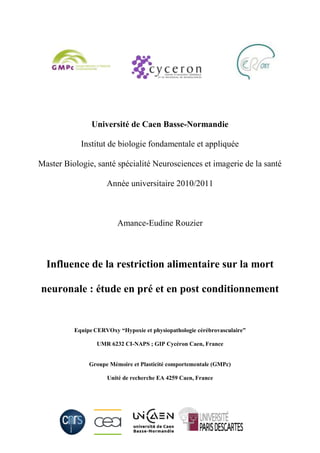Influence de la restriction alimentaire sur la plasticité cérébrale
•Télécharger en tant que DOCX, PDF•
0 j'aime•339 vues
Signaler
Partager
Signaler
Partager

Recommandé
Recommandé
More than Just Lines on a Map: Best Practices for U.S Bike Routes
This session highlights best practices and lessons learned for U.S. Bike Route System designation, as well as how and why these routes should be integrated into bicycle planning at the local and regional level.
Presenters:
Presenter: Kevin Luecke Toole Design Group
Co-Presenter: Virginia Sullivan Adventure Cycling AssociationMore than Just Lines on a Map: Best Practices for U.S Bike Routes

More than Just Lines on a Map: Best Practices for U.S Bike RoutesProject for Public Spaces & National Center for Biking and Walking
Contenu connexe
En vedette
More than Just Lines on a Map: Best Practices for U.S Bike Routes
This session highlights best practices and lessons learned for U.S. Bike Route System designation, as well as how and why these routes should be integrated into bicycle planning at the local and regional level.
Presenters:
Presenter: Kevin Luecke Toole Design Group
Co-Presenter: Virginia Sullivan Adventure Cycling AssociationMore than Just Lines on a Map: Best Practices for U.S Bike Routes

More than Just Lines on a Map: Best Practices for U.S Bike RoutesProject for Public Spaces & National Center for Biking and Walking
En vedette (20)
Content Methodology: A Best Practices Report (Webinar)

Content Methodology: A Best Practices Report (Webinar)
How to Prepare For a Successful Job Search for 2024

How to Prepare For a Successful Job Search for 2024
Social Media Marketing Trends 2024 // The Global Indie Insights

Social Media Marketing Trends 2024 // The Global Indie Insights
Trends In Paid Search: Navigating The Digital Landscape In 2024

Trends In Paid Search: Navigating The Digital Landscape In 2024
5 Public speaking tips from TED - Visualized summary

5 Public speaking tips from TED - Visualized summary
Google's Just Not That Into You: Understanding Core Updates & Search Intent

Google's Just Not That Into You: Understanding Core Updates & Search Intent
The six step guide to practical project management

The six step guide to practical project management
Beginners Guide to TikTok for Search - Rachel Pearson - We are Tilt __ Bright...

Beginners Guide to TikTok for Search - Rachel Pearson - We are Tilt __ Bright...
Unlocking the Power of ChatGPT and AI in Testing - A Real-World Look, present...

Unlocking the Power of ChatGPT and AI in Testing - A Real-World Look, present...
More than Just Lines on a Map: Best Practices for U.S Bike Routes

More than Just Lines on a Map: Best Practices for U.S Bike Routes
Ride the Storm: Navigating Through Unstable Periods / Katerina Rudko (Belka G...

Ride the Storm: Navigating Through Unstable Periods / Katerina Rudko (Belka G...
Influence de la restriction alimentaire sur la plasticité cérébrale
- 1. <br />Université de Caen Basse-Normandie<br />Institut de biologie fondamentale et appliquée<br />Master Biologie, santé spécialité Neurosciences et imagerie de la santé<br />Année universitaire 2010/2011<br />Amance-Eudine Rouzier<br />Influence de la restriction alimentaire sur la mort neuronale : étude en pré et en post conditionnement<br />Equipe CERVOxy “Hypoxie et physiopathologie cérébrovasculaire”<br />UMR 6232 CI-NAPS ; GIP Cycéron Caen, France<br />Groupe Mémoire et Plasticité comportementale (GMPc)<br />Unité de recherche EA 4259 Caen, France<br />Résumé :<br />Se nourrir est un besoin essentiel pour la vie et aussi un plaisir. Mais, de nos jours et dans les pays développés, manger devient la source de nombreux maux. En effet, l’obésité, le diabète, les maladies cardiovasculaires et certains cancers sont souvent dus à une alimentation déséquilibrée et surtout trop abondante. Il est donc primordial de trouver un moyen de limiter l’apparition de ces maladies. La solution qui paraît la plus évidente serait de moins manger mais malheureusement, comme pour toute prévention, chacun se fait son avis sur la chose. Pourtant certaines études scientifiques ont de quoi en persuader plus d’un. Dès 1935, Clive McCay s’intéresse à l’influence de l’alimentation sur l’espérance de vie et montre qu’une restriction alimentaire de 30% effectué chez des souris augmente de 40% leur longévité. Cette découverte va alors pousser les scientifiques à comprendre les effets bénéfiques de la restriction alimentaire et plus particulièrement dans le cadre de maladies neurodégénératives (maladie de Parkinson, d’Alzheimer, le cancer…) et dans celui de l’AVC, qui touche de plus en plus de personnes chaque jour surtout dans la population occidentale. Il va de soi que la restriction alimentaire diminue le risque de développer ces maladies mais qu’en est-il lorsque l’on réalise cette restriction tant que « traitement » après qu’une maladie soit diagnostiquée ?<br />Abstract :<br />To feed is an essential need for the life and also a pleasure. But, nowadays and in the developed countries, to eat becomes the source of numerous troubles. Indeed, the obesity, the diabetes, the cardiovascular diseases and certain cancers are often owed to an unbalanced food and especially too plentiful. It is therefore essential to find a way to limit the occurrence of these diseases. The solution that seems the most obvious would be to eat less but unfortunately, as for any prevention, each makes the opinion on the matter. Nevertheless certain scientific studies have of what to persuade more than one. From 1935, Clive McCay is interested in the influence of the food on the life expectancy and shows that a dietary restriction of 30 % made mice increase by 40 % their longevity. This discovery will then push scientists to understand the beneficial effect of dietary restriction, especially in case of neurodegenerative diseases (like Parkinson’s, Alzheimer’s, cancer…) and stroke which affect more and more people every day especially in the Western population. It is obvious that dietary restriction reduces the risk of developing these disease, but what happened when you realize this restriction as a treatment after a disease is diagnosed ? <br />